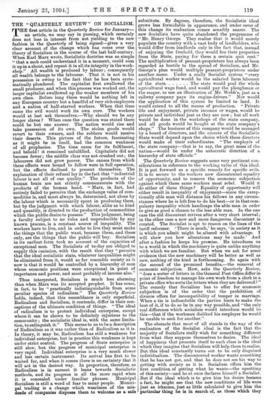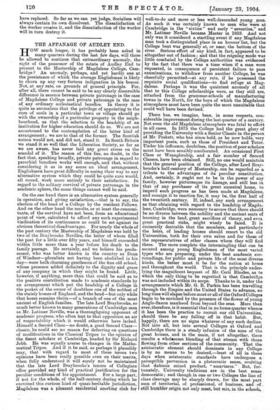T HE first article in the Quarterly Review for January— an
article, we may say in passing, which certainly does not lose in interest from not yielding to the new fashion in the Quarterly of being signed—gives a very clear account of the change which has come over the theory of Socialism in the course of the last half-century. When Karl Marx wrote, Socialistic doctrine was so simple "that a mob could understand it in a moment, could sum it up in a shout, and repeat it in all its integrity in the work- shop." All wealth is produced by labour ; consequently all wealth belongs to the labourer. That it is not in his possession is owing to the fact that he has been syste- matically plundered. The capitalist first swallowed the small producer, and when this process was worked out, the larger capitalist swallowed up the weaker members of his own class. Before long there would be nothing left in any European country but a handful of very rich employers and a nation of half-starved workers. When that time came the evil would work its own cure. The workers would at last ask themselves,—Why should we be any longer slaves ? When once the question was stated there could be but one answer. The nation would rise and take possession of its own. The stolen goods would revert to their owners, and the robbers would receive their deserts. This picture of the future, fascinating as it might be in itself, had the common weakness of all prophecies. The time came for its fulfilment, and behold! it remained unfulfilled. Capitalists did not become fewer; the middle class was not crushed out; the labourers did not grow poorer. The causes from which these effects were bound to follow were in full operation, but the effects declined to present themselves. The explanation of their refusal lay in the fact that "industrial labour is not all of one quality." The products of the human brain are not strictly commensurate with the products of the human hand,. "Marx, in fact, had entirely failed to perceive that the exchange value of com- modities is, and must always be, determined, not alone by the labour which is necessarily spent in producing them, but by the judgment with which labour, alike as to kind. and quantity, is directed, to the production of commodities which the public desire to possess." This judgment, being a faculty subject to no rules and unproducible by any known process, is a constant source of inequality. The workers have to live, and in order to live they must make the things that the public want, because these, and these only, are the things that the public will buy. Socialism in its earliest form took no account of the capacities of exceptional men. The Socialists of to-day are obliged to supply this omission, with the result that they "perceive that the ideal socialistic state, whatever inequalities might be eliminated from it, would so far resemble society as it now is that it would be controlled by a hierarchy of men whose economic positions were exceptional in point of importance and power, and. most probably of income also."
Thus interpreted, Socialism is much less alarming than when Marx was its accepted prophet. It has come, in fact, to be "practically indistinguishable from some peculiar species of radicalism." The Quarterly Review holds, indeed, that this resemblance is only superficial. Radicalism and Socialism, it contends, differ in their con- ceptions of the ultimate condition of things. "The ideal of radicalism is to protect individual enterprise, except where it can be shown to be definitely injurious to the community ; the socialistic ideal is, with the same limita- tion, to extinguish it." This seems to us to be a description of Radicalism as it was rather than of Radicalism as it is. In theory, it may be, Radicalism has still a weakness for individual enterprise, but in practice this weakness is kept under strict control. The progress of State enterprise is still slow, but the progress of municipal enterprise is very rapid. Individual enterprise is a very much slower and less certain instrument. Its arrival has first to be waited for, and when it comes there is no certainty that it will act in the desired way. In proportion, therefore, as Radicalism is in earnest it leans towards Socialistic methods, and its progress is all the more rapid when it is concealed under familiar phrases. Municipal Socialism is still a word of fear to many people. Munici- pal is a change which weariness of the mis- deeds of companies disposes them to welcome as a safe substitute. By degrees, therefore, the Socialistic ideal grows less formidable in appearance, and under cover of this change its realisation comes sensibly nearer. The new Socialists have quite abandoned the programme of "Mr. Henry George. They realise that it would merely populate the country with a vast body of landholders, who would differ from landlords only in the fact that, instead of enjoying the freehold, they would feu their properties from the State, paying for them a certain quit rent." The multiplication of peasant-proprietors has always been regarded as hostile to the spread of Socialism, and Mr. George's plan would multiply peasant-proprietors under another name. Under a really Socialist system "every agricultural worker would be the salaried farm labourer of the state The state would pool the whole agricultural wage fund, and would pay the ploughman or the reaper, to use an illustration of Mr. Webb's, just as a railway company pays its engine-drivers." Nor would the application of this system be limited to land. It would extend to all the means of production. "Private life and enjoyment, private incomes or wages, would be private and individual just as they are now ; but all work would be done in the workshops of the state company, and all goods would be bought at the state company's shops." The business of this company would be managed by a. board of directors, and the success of the Socialistic State would depend upon the choice which these directors would make of their subordinates. "The employes of the state company—that is to say, the great mass of the nation—would be under the autocratic direction of a hierarchy of state officials."
The Quarterly Review suggests some very pertinent con- siderations in reference to the working value of this ideal. It is put forward as a specific remedy for specific evils. It is to secure to the workers now discontented equality of opportunity, and to remove the economic subjection against which these same workers most rebel. Would it do either of these things ? Equality of opportunity will either result in inequality of enjoyment—since the excep- tionally able man will distance his fellows in any circum- stances where he is left free to do his best—or in that com- pulsory inequality which handicaps the able man in order to give as good a chance to the less able man. In the one case the old discontent revives after a very short interval ; in the other case a new and more dangerous discontent is created. The Socialist is apt to reason on the lines of the tariff reformer. There is much,' he says, in society as it is which you admit might be altered with advantage. I will show you how alterations may be made.' And after a fashion he keeps his promise. He introduces us to a world in which the machinery is quite unlike anything with which we are familiar. But when we ask for some evidence that the new machinery will be better as well as new, nothing of the kind is forthcoming. So again with the second of the promised benefits,—the removal of economic subjection. How, asks the Quarterly Review, "does a sorter of letters in the General Post Office differ in point of freedom to manage his own work from a clerk in a private office who sorts the letters when they are delivered ? " The remedy that Socialism has to offer for economic subjection is of the order that the prohibition of divorce offers for incompatibility of temper in marriage. When a tie is indissoluble the parties learn to make the best of it, if to do so be in any way possible, and "the only real difference which socialism would introduce would be this—that if the workman disliked his employer he would be unable to seek for another."
The obstacle that most of all stands in the way of the realisation of the Socialist ideal is the fact that the majority of Socialists really wish for something different from what they suppose themselves to desire. The ideal of happiness that presents itself to each class is the ideal which they imagine that Socialism will help them to realise. But this ideal constantly turns out to be only disguised individualism. The discontented worker wants something that he has not got, and that he does not see his way to getting with society as it is. Socialism offers him the first condition of getting what he wants—the upsetting of this society—and he at once declares himself a Socialist. But if the ideal which is to give him his desire became a fact, he might see that the new conditions of life were just as irksome, just as little calculated to give him the particular thing he is in search of, as those which they have replaced. So far as we can yet judge, Socialism will always contain its own dissolvent. The dissatisfaction of the worker creates it, and the dissatisfaction of the worker will in turn destroy it.











































 Previous page
Previous page